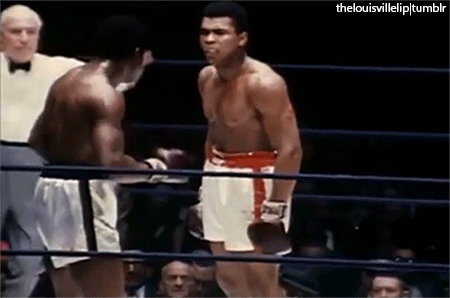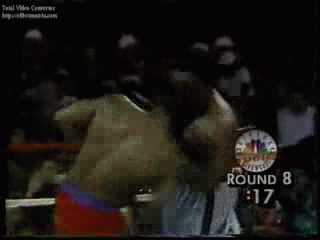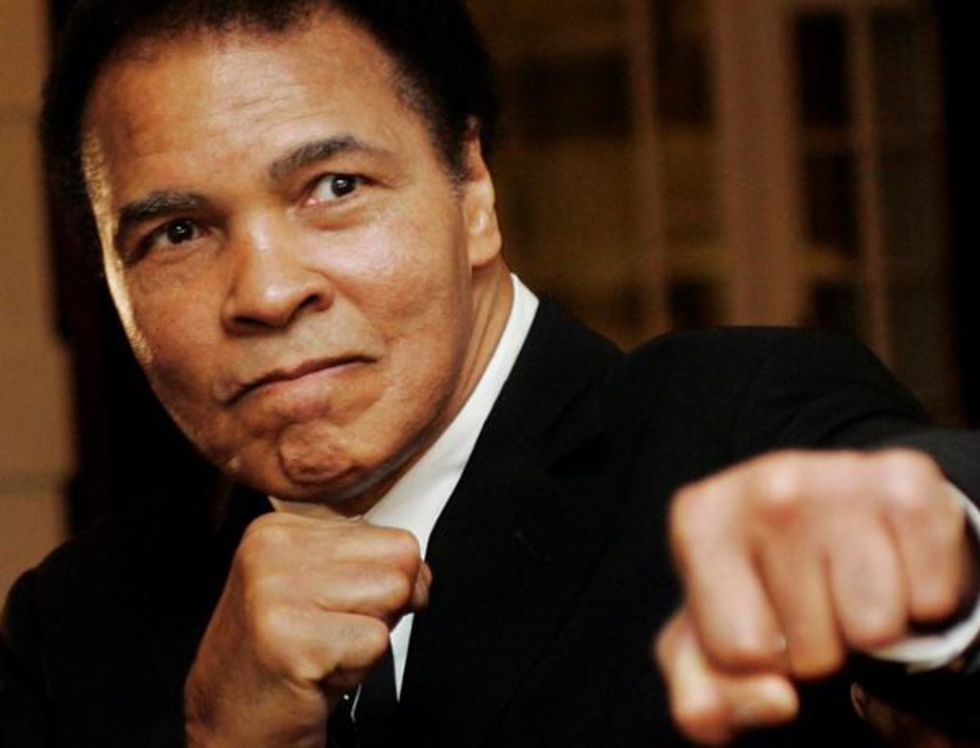Following the death of Muhammad Ali earlier this week, I couldn't help but feel like I'd just lost an old friend. As a Muslim kid growing up in the Bronx in a post-9/11 world—where Muslims were, and still are, reviled and dehumanized by society—to me, Muhammad Ali wasn't just an icon, boxer or celebrity. He was one of my role models growing up and largely shaped the person I am today. I remember as a 13-year-old boy staying up until dawn to as I watched his most legendary bouts in awe at his footwork, hand speed and intelligence in the ring on ESPN Classic. I fondly recall being engrossed in the life of Ali and the man he was whenever I had the privilege of catching the many documentaries that would recount his fights in the form of stories, and explore his disruptive and unconventional actions outside of the ring (read: challenging the status quo).
Although his finesse in the ring, his unmatched confidence, his revolutionary style of boxing and his constant reprimanding of the public for not recognizing that he was in fact "The Greatest," paved the way for the world all over to recognize him as "The Greatest of All Time"; that's not why I believe he's the greatest athlete to ever grace the modern world. What separates Ali from the Michael Jordans, Babe Ruths and Lionel Messis of the athletic world was his unflinching courage and sincerity in the face of his enemies in and outside of the ring.
When his opponents stepped into the ring with him, they weren't just fighting Ali the boxer, they were fighting Ali the man, himself. His unyielding will, his humor, his dedication to truth, his unashamed advocacy and embodiment for black dignity and his faith—all that encompassed Ali the man was not sidelined for Muhammad Ali the boxer. Ali was the personification of a fighter, but his fight did not end at the bell or the scorecards.
When Muhammad Ali first converted to the Nation of Islam, the media and the boxing world were quick to demonize him. The World Boxing Association (WBA) went as far as stripping Ali of his belt due to his conversion, while the media refused to acknowledge Muhammad Ali by his new name. Ali denounced his previous name, Cassius Clay, due to the roots it had in slavery and instead, requested people to call him by his new name, Muhammad Ali. The blatant disregard and disrespect for his decision was not only perpetuated by the media but was even practiced by his fellow boxers.
Just as Ali fought society outside of the ring to abandon his slave name and to adopt his chosen one, he too fought for that same dignity in the ring when a boxer, by the name of Ernie Terrell, continuously referred to Ali as Cassius Clay when prompted by Ali to say his name correctly. Ali effectively showed Terrell and the world that he was not going to allow his conversion and name-change to be disrespected by those that disagree in an infamous fight known as the What's My Name Fight. In it, Ali repeatedly yelled at Terrell, "What's my name?!" Just as Terrell learned in that fight, the world too learned and eventually came around to referring to Muhammad Ali, as Muhammad Ali. Later in his life, he left the Nation and followed in the footsteps of Malcolm X and accepted traditional Islam as his religion.
"What's my name!?" - Muhammad Ali
Ali refused to be a slave to anyone or anything, including his success as a boxer. There are very few athletes throughout history that would give up the most prized possession of their sport, or even a couple of their prime years, because of a refusal to comply with their country's demands. Yet, Ali sacrificed both for what he believed was the right thing. The date was April 28, 1967, in a momentous decision unrivaled by any other entertainer or athlete since was made. Ali refused to step forward after his name was called in the draft to participate in the Vietnam War. Here was a black man, a Muslim and one of the most recognizable faces in the world, unabashedly calling out the United States government for its hypocrisy while the U.S. sought to convince the world that it was the pinnacle of morality and justice in order to eradicate the Soviet threat on the other side of the globe.
He was the antithesis of the protestant Christian, white supremacist, Capitalist colony known as America. The aftermath was swift and brutal; Ali was to be made an example of to ensure that this unacceptable affront and disrespect to the powers that be never occurs again. As a result, his heavyweight championship was stripped from him once again by the WBA and at the peak of his athletic ability, he was denied his boxing license for three years.
Much like his boxing career—where he refused to ever quit on a fight and never in his career was knocked down long enough for a ten second count—Ali came back three years later and once again dominated the sport when he unexpectedly defeated George Foreman in the famous "Rumble in the Jungle" in 1974, much to the chagrin of his political opposition. Ali's come back and success transcended boxing. It was a political statement, a testament to the black will and an opposition to the colonialist narrative the U.S. so desperately was trying to hold onto following the Civil Rights movement of the 60s.
Foreman was adored by the white media due to his American and Christian pride exemplified by his raising of the American flag following his winning of an Olympic gold medal in boxing and his constant reprimanding of Muhammad Ali. He was the ideal opponent for Ali, he was the perfect representation of what made America great and what made Ali, a black Muslim, the enemy to that greatness. Ali on the other hand, was a menace. Ali threw his gold medal into a river after being denied service in a restaurant due to the color of his skin; Ali, an international figure, openly refused to fight in the Vietnam War because he would rather obey the laws of Allah rather than the laws of the land.
Ali was the old black man, the 32-year-old washed-up hack that needed to step out of relevance while George Foreman was the new desired face of blackness following the Civil Rights movement. He was the black man that was fine with the way things were and had no complaints, he was merely an entertainer. Ali was hated in America, but what he represented resonated all around the world. His influence was far-reaching and succinctly illustrated in almost movie-like fashion when the citizens of Zaire (where this fight took place) regularly chanted "Bumaye Ali"—Ali kill him—as he was training for and during the fight itself.
Ali taught me the value of standing up for oneself. Ali taught me that no matter what opposition the world may pose to you for standing up for what you believe, so long as you're on the path of truth and justice, you will rise up and overcome. Ali taught me that I should not fear my name, I should not fear my identity and that I should be willing to make the sacrifices I need to even when things are looking grim. Ali taught me that sometimes people have to be forced to respect you and if you shove your own self-dignity and self-respect in their faces long enough, they will follow suit. Ali taught me humility when after developing Parkinson's disease he humbly took his place on the totem pole and said, "God gave me Parkinson's syndrome to show me I'm not 'The Greatest'—he is."
It's a shame then that following his death, many people, like those in the past who stripped Ali's well earned heavyweight championship title from him unjustly, are now attempting to strip Ali of his various identities. Many Muslims are completely denying his black identity despite the fact that Muhammad Ali's reason for conversion to Islam was largely due to its acceptance of his racial identity. He did not just stand up for his religious rights, but for his rights as a black man as well. Many white people and politicians are stripping him of his controversial and political identity, as if he was merely a boxer and entertainer and did not give pause to the white supremacist powers of his time whenever he spoke.
His Muslim identity, too. is being ignored or even demonized, with many journalists referring to Muhammad Ali as Cassius Clay in their articles when any modicum of sincere research and journalism would show what Ali would think of doing such a thing. Even the White House's statement sought to undermine Ali from the perspective of his religious identity by unashamedly pointing out that his actions were not consistent with his religious beliefs.
Unfortunately, the backhanded compliments and passive aggressive denials of his identity come at a time when he can no longer stand up for himself. It is imperative now that his legacy is not allowed to be dishonored and whitewashed by those showing faux appreciation for the man that he was, and for those that he stood up for when he was alive should stand up for him after his death. Muhammad Ali left a legacy that embodied courage, self-acceptance and righteous sacrifice. The only meaningful way to honor such a legacy is by embodying it to remind society and the political establishment that Muhammad Ali will continue to live on, despite the failed attempts to keep him buried for good. In a world that wanted to keep him confined to a ring, Ali instead made the world his ring.
Rest in Power, Muhammad Ali.
























